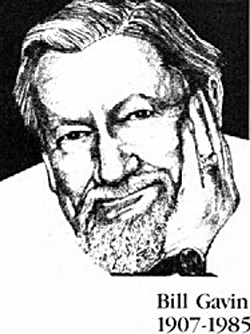 To ‘Program’ A Radio ‘DJ’ Or Not. The Debate Lingers
To ‘Program’ A Radio ‘DJ’ Or Not. The Debate Lingers
By BILL GAVIN
Billboard Contributing Editor
 Some radio people don’t like the term “disk jockey.” Nobody seems to know where or when the term originated. In spite of many attempts to find a more suitable substitute, the name has stuck and has come into common usage. Webster’s dictionary says, “disk jockey: a person who conducts a radio program of recorded music, interspersed with chatter, jokes and commercials.” There is some question whether the word is properly “disk” or “disc,” but since lexicographers give the two spellings identical meanings, we are apparently free to make our own choice of spelling.
Some radio people don’t like the term “disk jockey.” Nobody seems to know where or when the term originated. In spite of many attempts to find a more suitable substitute, the name has stuck and has come into common usage. Webster’s dictionary says, “disk jockey: a person who conducts a radio program of recorded music, interspersed with chatter, jokes and commercials.” There is some question whether the word is properly “disk” or “disc,” but since lexicographers give the two spellings identical meanings, we are apparently free to make our own choice of spelling.
In a search for a more distinctive title for the trade of “conducting a radio program of recorded music,” some stations publicize their disk jockeys as “personalities.” This has always struck me as an awkward and highly misleading term. Fortunately, it has not become widely used.
A current fad is to refer to the station’s dj’s as “the good guys.” Whether or not this implies that the dj’s of all other stations are bad guys, I wouldn’t know. It is not likely, however, that our dictionaries will ever list “good guys” or “personalities” as synonymous for“disk jockeys.”
Not only is the real difference of opinion over what to call a disk jockey, there is also some little variety in what is expected of him on the job. More than one program director has said: “We don’t want any time-and-temperature jocks.” They were referring, of course, to the standard minimum for “top 40″ dj’s, whose air words are strictly limited to time signals, weather announcements, station’s call letters and their names, all endlessly reiterated. Special promo announcements are fully written out, and the rest are detailed instructions about when, where and how to identify the various records. The ability to adlib is not considered an essential qualification for such an assignment.
Although a lot of progressive radio people turn up their noses at such a stereo-typed formula operation, many stations employ it with considerable success. It has certain advantages: It guarantees the briefest minimum of talk between records; the station sounds the same at all times of the day; and an experienced dj can speedily master the job and high salaries for skilled men are unnecessary, which has a beneficent effect over head costs. Such advantages are important in smaller markets, where potential billings are limited, but a number of large cities also include similar minimum operations.
When the controls and limitations are removed from the disk jockey, and he is told to make his show colorful and entertaining.the question is: what does he have to say? All too often what he has to say turns out to be self-important, long winded, unfunny and down right dull. One of the most frequent failings of the so-called personality dj is his insistence on intruding himself at every possible opportunity. To him the music he plays is simply a breathing space in a continuous monolog. In a few rare cases, such a spotlight seeker may hold a big rating; in most cases he is soon recognized as a colossal bore, who is better suited to a job as a carnival barker or tourist guide.
One well-known program director decided a few years ago that he would make his dj staff personalities “by the book.” He established an elaborate system specifying what the dj’s could say, should say, and must say. Wit and humor were not simply permitted, they were required. Card files of gags and stories were inconstant use. An elaborate set of musical jingles was spotted rigidly through every hour oft he broadcast day. Did it work? Yes, it did, and the fact that it worked so well was a tribute to this particular program director’s imaginative genius. It is not, however, a system that could be recommended for general use.
The new school of disk jockeys that is emerging these days is well trained in the arts of brevity, pacing and production. The humor is spontaneous rather than lifted from a gag file. The comments are relevant, with a minimum of personal reference. Most of all, the music is the show, and the dj’s function is simply to present his show in as interesting a manner as possible.
There’s no reason why a disk jockey has to be an automation. He can sound like a human being. Its unfortunate that more of them don’t. END
_______________
Information, credit, and news source: Billboard; March 21, 1964
![]()

